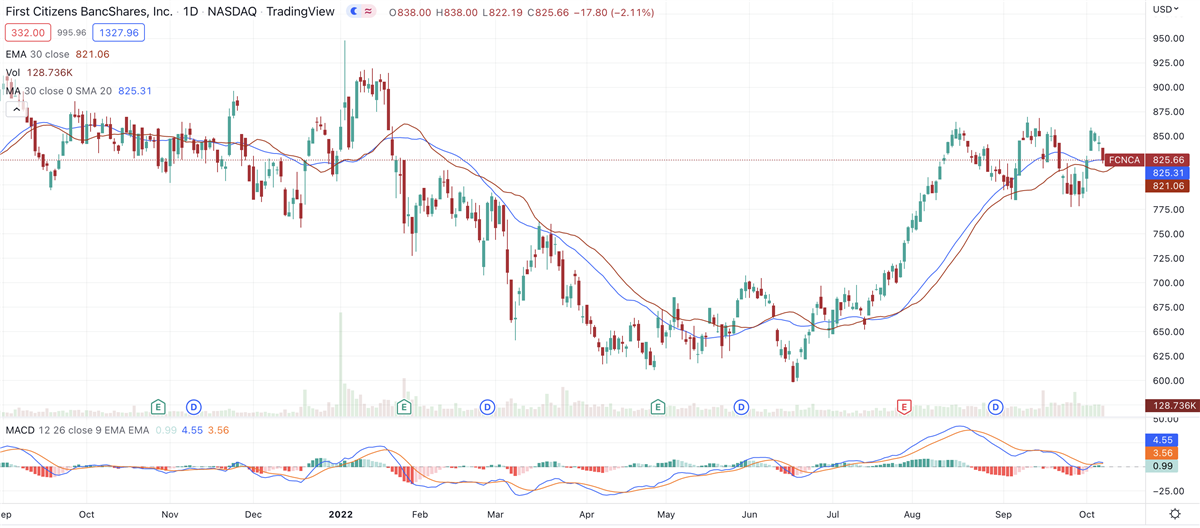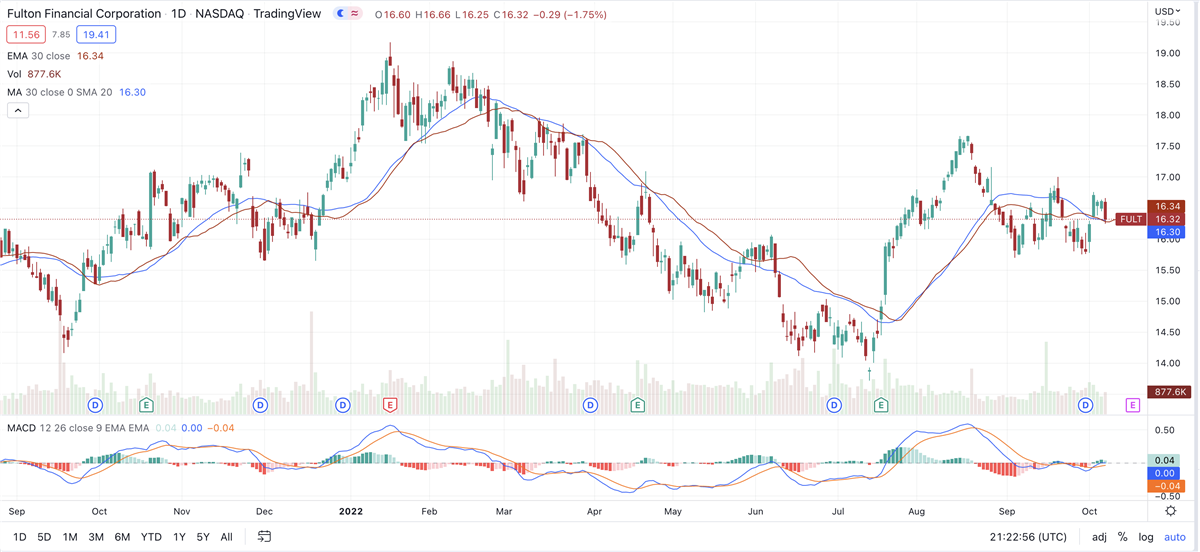Large-cap financials such as JPMorgan Chase (NYSE: JPM), Bank of America (NYSE: BAC) and Wells Fargo (NYSE: WFC) rallied early this week along with the broader market, while some smaller bank stocks, like First Citizens Bancshares (NASDAQ: FCNCA), have been outpacing the wider sector.
 MarketBeat.com – MarketBeat
MarketBeat.com – MarketBeat First Citizens, like its entire industry, has seen net interest income and margins expand as interest rates increase. That typically occurs in an environment of rising rates.
Regional banks can fly beneath the radar as investment opportunities. Unless you live in an area where one of these banks operates, they aren’t obvious candidates that fall under the famous Peter Lynch “buy what you know” category of investment ideas. But a screener, such as the one you’ll find on MarketBeat.com, can help you identify some not immediately obvious names.
First Citizens is a North Carolina-based regional bank that operates 529 branches and offices in 19 states and Washington, DC. It has a market capitalization of $13.48 billion, making it the largest company within the southeast/regional bank sub-industry.
The stock has been outperforming not only the financial sector as a whole, but also its regional banking peers. Shares are up 5.78% in the past month and 25.47% in the past three months.
MarketBeat analyst data for the stock shows a “moderate-buy” rating with a price target of $925, a potential upside of 9.67%.
The stock staged a cup-with-handle breakout on September 12, but chopped along with the broader market volatility. It’s been unable to sustain the breakout, and closed below its 50-day moving average the week ended September 30, but regained that price line. It’s currently trading above its 10- and 21-day moving averages.
The company reports third-quarter earnings on October 27, with Wall Street eyeing net income of $19.77 per share on revenue of $1.02 billion. Those would be increases of 62% and 110%, respectively.
For the full year, analysts expect the company to earn $69.33 per share, up 29% over 2021. Next year, that’s seen rising an additional 31% to $91.05 per share.
Other banks, of course, will benefit from a rising-rate environment, and some are already showing share-price appreciation reflecting strong fundamentals. 
Currently, Pennsylvania-based Fulton Financial (NASDAQ: FULT) is also outperforming financials as a whole. The stock is up 5.94% in the past month and 15.43% in the past three months.
Fulton has a market capitalization of $2.635 billion, putting it either the higher end of the small-cap categorization or lower end of mid-cap.
It’s currently forming a cup-with-handle pattern, with a potential buy point above $17.67. It’s been languishing below that point since mid-August.
According to MarketBeat earnings data on the stock, Fulton topped earnings views in five of the past six quarters. In the quarter ended in December 2021, the company met views of $0.37 per share.
Fulton is due to report its third quarter on October 18, after the closing bell. Analysts expect the company to earn $0.44 per share on revenue of $198.64 million. Both would be lower than the year-earlier results, but often, positive guidance can offset declines in revenue or earnings, and send the stock higher.
Fulton is categorized as a super-regional bank, meaning it has significant operations in several states.
Larger, more familiar super-regional banks include PNC (NYSE: PNC). This Pittsburgh-based bank has a large presence in the northeast, with more than 2,600 branches. The stock has been in a correction since January, but so far, has been finding a floor between $146 and $147.
Another large-cap super-retional is U.S. Bancorp (NYSE: USB), which is down 24.37% year-to-date. It’s also been correcting since January. Unlike PNC, it’s not clear that it’s found its price floor yet.
It’s not always the largest, most familiar names that offer the best opportunity at any given time. While it’s true that the traditional advice to “buy low, sell high” is correct in any market cycle, it’s not necessarily best to identify the most beaten-down stocks, when a stock that’s holding up better than the broader market may present more opportunity.
https://www.entrepreneur.com/article/436865

